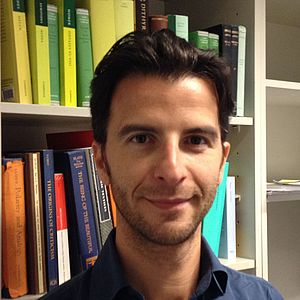
Dr. Giovanni Fanfani
Forschungsinstitut für Technik- und Wissenschaftsgeschichte
Wissenschaftlicher Mitarbeiter
Curriculum vitae
- Since February 2017
postdoctoral researcher in the ERC Consolidator Grant project PENELOPE: a Study of Weaving as Technical Mode of Existence, directed by Dr. Ellen Harlizius-Klück. Forschunginstitut, Deutsches Museum, Munich. - September 2014 – November 2016
postdoctoral researcher, DFF-MOBILEX Fellow (COFUND), The Danish National Research Foundation’s Centre for Textile Research (CTR), SAXO Institute, University of Copenhagen. - January 2012 – August 2014
Part-time Research Assistant, The Danish National Research Foundation’s Centre for Textile Research, SAXO Institute, University of Copenhagen. - January – May 2010
Italian Lecturer, Department of Western Languages, Faculty of Arts, Chulalongkorn University, Bangkok. - March 2006 – May 2009
PhD in Greek and Latin Philology, Department of Classical Philology, University of Bologna. Thesis title: ‘The intertextuality of Euripides’ Trojan Women’ (in Italian). - 2003-2005
Postgraduate programme for teaching qualification (SSIS), Faculty of Humanities, University of Pisa and University of Florence. Teaching degree in Greek and Latin language and literature, Italian language and literature, History, Geography. - 1998 – 2003Undergraduate programme (BA + MA) in Classics, Department of Classical Philology, Faculty of Humanities, University of Florence.
Research projects
- 2017 ‒ : PENELOPE. A Study of Weaving as Technical Mode of Existence. Team member, postdoctoral researcher. ERC Consolidator project directed by Dr. Ellen Harlizius-Klück. Forschungsinstitut für Technik- und Wissenschaftsgeschichte, Deutsches Museum, Munich.
- 2014 – 2016: Performing the Fabric of Song. Textile Technology and Imagery in Ancient Greek Poetry and Poetics. An Interdisciplinary Study in Metaphors and Terminology. DFF-MOBILEX Mobility Grant (COFUND), funded by the Danish Minister for Independent Research/Humanities and FP7 Marie Curie Actions. Postdoctoral individual fellowship hosted at the Centre for Textile Research, SAXO Institute, University of Copenhagen.
- 2012 – 2016: Textile Economies in the Mediterranean Area. Team member. Research programme hosted at the Centre for Textile Research, SAXO Institute, University of Copenhagen, and directed by Prof. Marie-Louise Nosch. Webpage: http://ctr.hum.ku.dk/economy/
Publications
- What melos for Try? Blending of lyric genres in the first stasimon of Euripides’ Trojan Women. In: Andujar, R.; Coward T.; Hadjimichael, T. (Hg.): Paths of Song. The Lyric Dimension of Tragedy. Berlin, Boston 2018, S. 239-263. doi: 10.1515/9783110575910-012
- Craftsmanship and technology as chorality: the case of weaving imagery in archaic and classical choral lyric. In: Dionysus ex Machina 9 (2018), S. 6-40. dionysusexmachina.it/dionysus2018/
- –; McLean, A.; Harlizius-Klück, E.: Cyclic Patterns of Movement across Weaving, Epiplokē and Live Coding. In: Dancecult: Journal of Electronic Dance Music Culture 10 (2018), S. 5-30. doi: 10.12801/1947-5403.2018.10.01.01
- Weaving a Song: Convergences in Greek Poetic Imagery between Textile and Musical Terminology. An Overview on Archaic and Classical Literature. In: Gaspa, S; Michel, C.; Nosch, M.-L. (Hg.): Textile Terminologies from the Orient to the Mediterranean and Europe, 1000 BC to 1000 AD. Lincoln, NE, 2017, S. 421-436. doi:10.13014/K2154F74
- Moduli di rappresentazione corale nelle Troiane di Euripide. In: Citti, F.; Iannucci, A.; Ziosi, A. (Hg.): Troiane classiche e contemporanee. Spudasmata 173. Zurich, New York, 2017, S. 31-48.
- –; Harlizius-Klück, E.: On Weaving and Sewing as Technical Terms for Ancient Greek Verbal Arts. In: Classical Inquiries 20.03.2017: https://classical-inquiries.chs.harvard.edu/on-weaving-and-sewing-as-technical-terms-for-ancient-greek-verbal-arts/
- -; Harlow, M.; Nosch, M.-L. (Hg.): Spinning Fates and the Song of the Loom. The Use of Textiles, Clothing, and Cloth Production as Metaphor, Symbol, and Narrative Device in Greek and Latin Literature. Ancient Textile Series 24. Oxbow Books, Oxford, 2016.
- -; Harlizius-Klück, E.: (B)orders in Ancient Weaving and Archaic Greek Poetics. In: Fanfani, G.; Harlow, M.; Nosch, M.-L. (Hg.): Spinning Fates and the Song of the Loom. The Use of Textiles, Clothing, and Cloth Production as Metaphor, Symbol, and Narrative Device in Greek and Latin Literature. Oxford, 2016, S. 61-99.
- ; Harlow, M.; Nosch, M.-L.: Textile and Clothing Imagery in Greek and Latin Literature: Structuring, Ordering, Dissembling. In: Fanfani, G.; Harlow, M.; Nosch, M.-L. (Hg.): Spinning Fates and the Song of the Loom. The Use of Textiles, Clothing, and Cloth Production as Metaphor, Symbol, and Narrative Device in Greek and Latin Literature. Oxford, 2016, S. 323-339.
- La μωρία θνητῶν (Eur. Tr. 95-97, 1203-1206). In: Eikasmós 24 (2013), S. 91-112.
